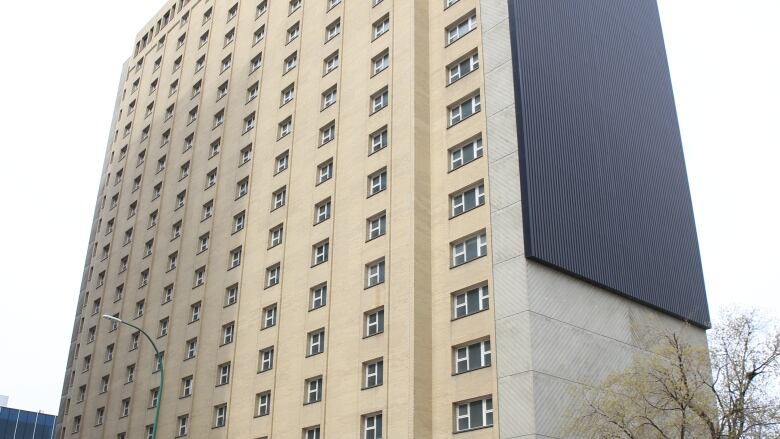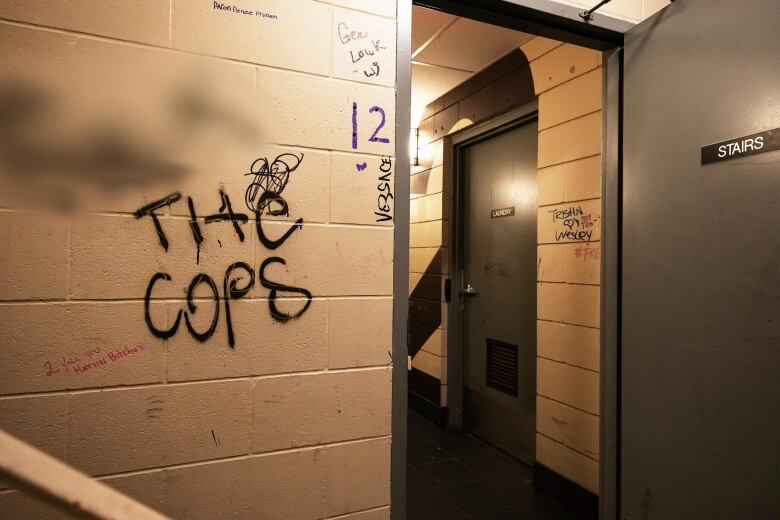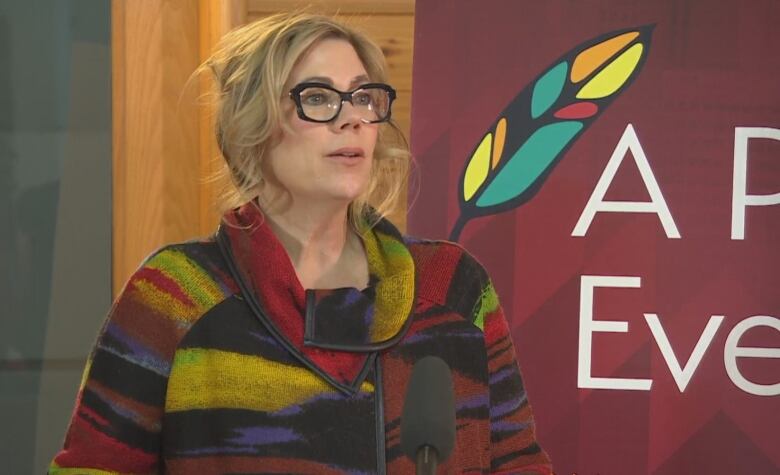Province sold more social housing units to the private sector than it created over past 7 years
287 social new housing rental units funded but 374 lost with sale of 185 Smith St.

The province is falling behind when it comes to creating new social housing at a time when advocates say it's needed most.
More social housing units were lost to a sale to the private sector than were created during the Progressive Conservative government's tenure, according to a CBC analysis.
The Right to Housing Coalition says 1,000 new social housing units are needed each year for the next 10 years to meet the housing needs of the lowest-income Manitobans
Over the past seven years, 287 social new housing rental units were funded by the PC government, say figures provided by a departmental spokesperson, but the province lost 374 units of social housing when it sold 185 Smith St.to the private sector in 2018,for a totalloss of 87 units.
"We're really disappointed because we felt like we had started to make some progress in Manitoba when it came to expanding supply," said Kirsten Bernas, chair of the provincial committee of the Right to Housing Coalition and research associate with the Canadian Centre for Policy Alternatives, referring to commitments to social housing made by the previous NDP government.
Initiated by NDP
Nearly two-thirds of the 287 social housing units created by the Tory government were initiated by the former NDP government, according to theCBC analysis.
CBC reporters cross-referenced announcements made over the last 20 years, by both the PCs and the NDP, with information obtained from the government, to trace affordable and social housing projects from the initial funding commitment to ribbon cutting.
The provincial government defines social housing as units that are rented for30 per cent of gross household income (commonly called rent-geared-to-income rates),or at shelter rates stipulated by the employment and income assistance program.
The PC government also supported 587 affordable units, which include buildings that charge below market rent which in Winnipeg ranges from $702 for a studio to $1,324 for a three-bedroom plus transitional, supportive, senior and assisted living housing.
The Right to Housing Coalition is also concerned about the decline in spending to keep buildings in good repair.
"New social housing supply will not help to reduce homelessness and housing insecurity if we don't prevent the loss of existing units," says the Right to Housing Coalition's action plan, which recommends spending $1.5 billion over the next 10 years to repair existing stock,in addition to its call for new units.
Annual reports show that over its last seven years in power, the former NDP government spent over $74.6 million a year, on average, fixing Manitoba Housing buildings across the province through its modernization and improvement budget.

That spending was cut over the next seven years under the Progressive Conservative government, with an annual average spend of just over $42.3 million, including new figures released Friday inthe Families Department's annual reportfor 2022-23.
Dozens of non-profit and co-op housing organizations also face expiring operating agreements with the province, as the CBC reported last week. The expiration of these agreements means non-profits will no longer receive a subsidy to provide and maintain units for low-income tenants.
PC spokesperson Shannon Martin said in an email to CBC News that his government "reinvested back into social housing over the past seven years."
He said the party is focused on creating more housing as part of its homelessness strategy, which he called the first of its kind.
The PC government's homelessness strategy, announced in February by Families Minister Rochelle Squires, who is also the minister responsible for Manitoba Housing, included the creation of 700 new social units at a cost of $58 million, on top of $68 million in previously announced measures.
Martin said housing is about more than just physical assets, "which is why we're creating a wrap-around supportive workforce for Manitoba Housing tenants."
Federal money available
In order to be compliant with its $176.5-million deal with the federal government under the national housing strategy, the province must pay for more than 3,300 new social housing units by March 31, 2028.
CBC News asked the three political parties that have seats in the Manitoba Legislature about what they would do for social housing, including whether they would commit to this target.
The only party that committed to creating more than 3,300 new social housing units was the Manitoba Liberals, who pledge "to develop and identify 10,000 housing unit options within two terms," leader Dougald Lamont said. The Liberals would eliminate the Manitoba Housing waitlist within five years of taking government, he said.
The PC party did not commit to 3,300 new social housing units by 2028, but pledged to build "the needed affordable housing in Manitoba."
The PCs said there is no specific timeline for when the waitlist will be eliminated, but it is a "priority we are committed to addressing."
The party also committed to a "robust repair program" without attaching a dollar value.

The PC party said it wouldworkwith non-profits to ensure they are still able to offer rent-geared-to-income units and will consult with providers to find what is needed to address the impact of the expiration of operating agreements.
The Manitoba NDP did not commit to meeting the target of building over 3,300 new social housing units in the next five years but said it "will build more social and affordable housing, working together with the federal government to meet the target."
A party spokesperson said the NDP has pledged to restore the $700 renters' tax credit the Progressive Conservatives reduced to $525 and to remove the PST on the construction of new affordable housing.
The NDP did not answer a question about whether it has a target for when it would eliminate the waitlist to move into Manitoba Housing.
The NDP says it will bring in an approval process to ensure better oversight over affordable non-profit housing and work with all levels of government to ensure that affordable housing units are protected as operating agreements expire, with the goal of preventing what happened at Lion's Place from happening again.
The287-unit housing complex, which had provided rent-geared-to-income housing for people 55 and over since 1982, was sold to a private company.Lions Housing Centres said they could no longer afford to operate it as social housing after the subsidy agreement with the provincial government ended.












_(720p).jpg)


 OFFICIAL HD MUSIC VIDEO.jpg)
.jpg)



























































































